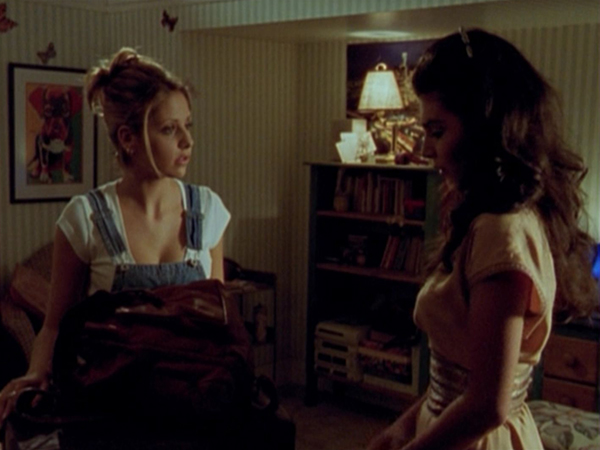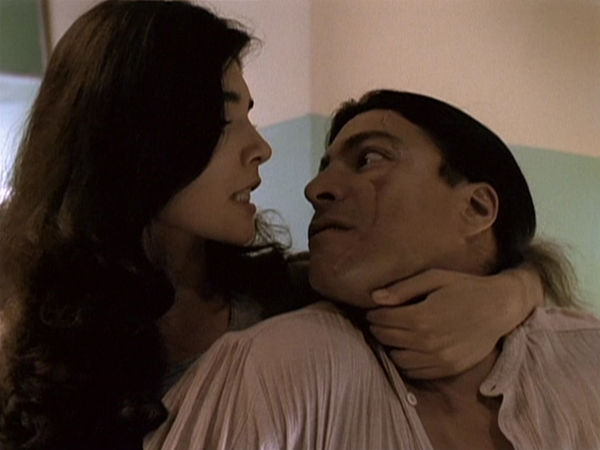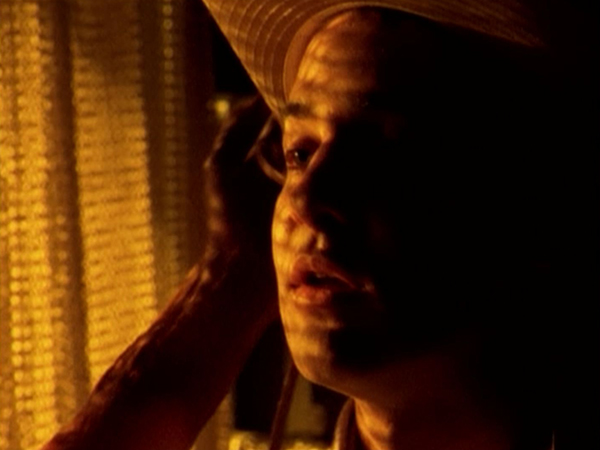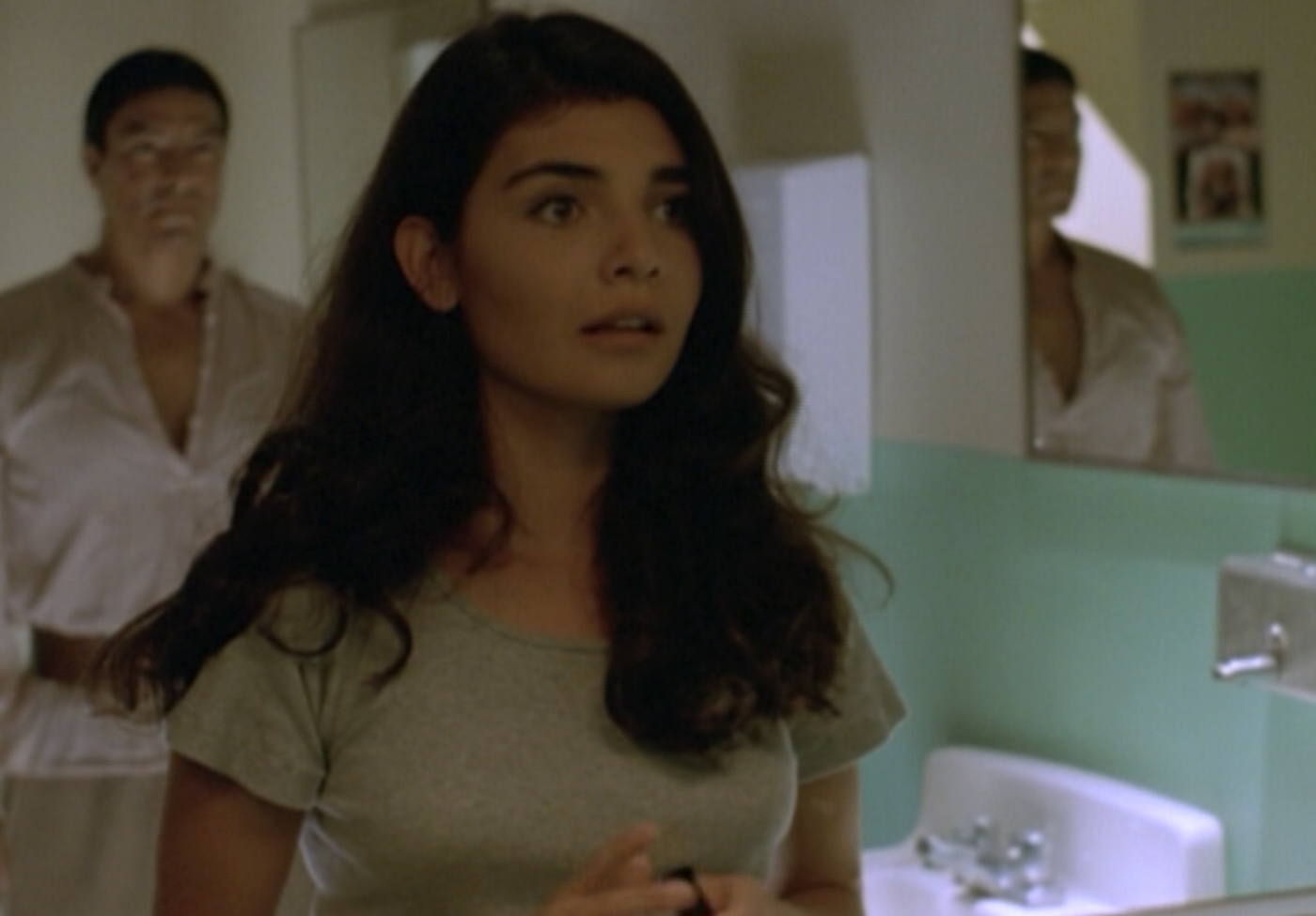Sometimes, a metaphor within a Buffy episode is tough to tease out. It’s hidden in layers and double-meanings. It might take a third or fourth viewing for it to emerge. Sometimes, it’s a metaphor that was probably never intended by the writers, but emerges upon intense analysis. Sometimes, you discover a completely new metaphor that becomes no more than an ephemeral feeling, disproven as quickly as it came to you. Honestly, those are the ones I find the most fun. Nothing like the feeling you get when you think you’ve just cracked open the centre of the universe and discovered a whole new show, then you take a nap and when you wake up you check your notebook and realise you have no earthly idea what you were talking about. Such is the joy of media over-analysis.
And sometimes, the metaphor is so obvious that it leaves you with not much more to say about it. Such is the case with Inca Mummy Girl.
So, here’s the thing. Ampata is Buffy. Buffy is Ampata. The end.

OK, not quite the end. I will put the evidence on the table. Ampata is a “Chosen One”, as her bodyguard literally tells her. She was selected by her people to be sacrificed in order to protect them against the evils of the underworld. She feels lonely (Buffy replies “I’ve been there”), and desires an escape from her destiny and to live a “normal” life. She has recently come back to life after having to die. As I said, it’s not incredibly subtle stuff. Buffy even spells it out for us in the episode’s closing scene.
“She was just a girl and she had her life taken away from her. I remember how I felt when the prophecy told me I was going to die.”
Buffy Summers
There’s nothing especially wrong with this. It seems a little trite from the point of view of someone whose main hobby is excessively overthinking this show, but this episode wasn’t made for people like me. It was made to fill 45 minutes in 1997. It’s a filler episode of a supernatural teen drama. We all know that Buffy is, on the whole, far, far more than that. But occasionally, it really is just that. And so it’s not too much of a crime that the writers came in, wrote “AMPATA IS BUFFY” in big red letters on the wall and called it a day. Sometimes, you want to make sure nobody misses your metaphor.
It does leave us with a slight shortage of things to say however. When I started this project I decided I would aim to break 2000 words on each episode, but this is one of those episodes that made me a little frightened of that pledge. I don’t want to skip over the forgotten episodes and leap straight to the big-hitters, but neither do I want to just rely on waffling and explaining the obvious in order to fulfil some pre-allocated space. That’s how filler happens. That’s how you end up with Inca Mummy Girl.
We’ve established that Ampata’s experience as a Sacrifice is akin to being a Slayer. But here’s a more interesting proposition: what if Ampata is, in fact, a Slayer? This might be one of those situations where a metaphor is so strong and obvious that it breaks free from the confines of figurative language and becomes entirely literal. I put forward to the jury that before Kendra, before Faith, before Nikki and Sineya and anyone else, the first non-Buffy Slayer that we see on screen in Ampata.
“They told her that she was the only one. That only she could defend her people from the nether world.”
Ampata, describing theSlayerInca Princess
It makes a certain amount of sense. The description given above requires no changes to be a perfect description of the Slayer. The Bodyguard fills the role of her Watcher, a patriarchal reminding her of her duty (using the same phrasing as Giles does to Buffy) and ensuring she stays on her pre-ordained path. She is imbued with super-strength, even besting Buffy in the climactic fight. There’s a lot going for this theory, and I choose to believe it primarily because I think it just makes the episode more fun.

The biggest sticking point with this theory is probably the fact that the Inca Princess is specifically sacrificed, rather than simply dying in the fight against evil, as Slayers are usually wont to do. But you can justify that with the suggestion that there was some prophecy, similar to the Pergamum Codex, that demanded Ampata’s death, just like Buffy’s was demanded in Prophecy Girl.
Indeed, the parallels to Prophecy Girl are everywhere here, even beyond the explicit reference in the final scene. The titles are strikingly similar, both having a “Noun Girl” construction. In both cases, a Slayer is told by their Watcher that they must die. The difference lies in how Ampata and Buffy react to that.
“You are the Chosen One. You must die. You have no choice.”
The Bodyguard and Ampata
“Yes, I do.”
Ampata is entirely right that she does, in fact, have a choice. Just as Buffy did. Ampata is a version of Buffy that made the opposite choice. She abandoned her duty, and so spreads death wherever she goes. While Xander’s kiss revitalises Buffy and fills her with new strength, Ampata’s kiss drains others of their life force. As much as she wants to kiss Xander, she can’t, and it’s because she’s made the wrong choice. Both of them want the normal, human life, but Buffy is allowed it because she selflessly gives it up to save others, while Ampata kills others to save her normal life. She is prepared to destroy her love interest – the metaphorical heart – while Buffy was re-animated by it.
“You gave up your life.”
Xander Harris and Buffy Summers
“I had you to bring me back.”
There is some indication in early season two that Buffy harbours some lingering resentment towards Giles for her death – as we see in her dream in When She Was Bad, with Giles strangling the life out of her. This thread isn’t fully explored, but I think there’s a hint of it when Giles takes the place of Ampata’s ‘Watcher’, and tries to re-assemble the seal – to ensure her return to the grave.

Part of the reason the Prophecy Girl parallel falls flat a little bit, beyond just being fairly on-the-nose, is that we’ve already seen Buffy complete this journey. Ampata represents an alternate path on a road that Buffy is at the end of. There’s not much more to say on that matter. It makes me wonder if this episode is perhaps a holdover idea from season one, because of how it seems to feed the preceding finale.
There are major ties to season two, however, in the form of the Xander/Ampata relationship, and how it foreshadows the ever-looming tragedy of Buffy and Angel. Ampata’s kiss destroys her partners. She cannot express physical love for someone without killing them. In a way, this is what Buffy does in Surprise. She ‘kisses’ the man she loves, and that act destroys him. Unlike Ampata, she obviously has no idea this will happen, but it forms the basis of her distress in the latter half of the season, as we’ll see with her outburst in I Only Have Eyes For You.
“James destroyed the one person he loved the most in a moment of blind passion. And that’s not something you forgive. No matter why he did what he did. And no matter if he knows now that it was wrong and selfish and stupid, it is just something he’s gonna have to live with.”
Buffy Summers, 2×19 I Only Have Eyes For You
Of course, given the choice, Buffy would not do this again. We see evidence of that in season three, when Buffy and Angel repress their sexual desire in order to save his soul. Ampata makes no such choice. She stops herself from killing Xander initially, but at the episode’s climax, when the chips are down, she is ready to kill him so that she can get what she wants. In a way, she could be seen as a more weak-willed version of Angel in Amends – who is prepared to sacrifice her love, to lose herself and her humanity in the embrace.
“You want life? You’re gonna have to take mine. Can you do that?”
Xander Harris and Ampata, 2×04 Inca Mummy Girl
“Yes!”
“Because I wanted to! Because I want you so badly! I want to take comfort in you, and I know it’ll cost me my soul, and a part of me doesn’t care.”
Angel, 3×10 Amends
Ampata is certainly representing Angel already here. She is another in a long list of undead love interests that Buffy’s friends are being paired up with. We saw Cordelia and Daryl in Some Assembly Required, Spike and Drusilla in School Hard, and now we have Xander and Ampata. It’s all driving towards the central story of Buffy and her own undead beau. Ampata is in fact doing double-shifts in the metaphor here – she is Buffy of course, but she is also Angel, the undead creature threatening to consume her Heart.
It would be remiss of me to end this essay without mentioning that this episode does serve a very important purpose in that it introduces us to a new character – a Short King who will go on to appear in dozens more episodes, and become a beloved mainstay of the series. I’m talking, of course, about Jonathan.

OK, no I’m not. Obviously I’m talking about Oz. He is the final title character of the High School Years to be introduced, rounding out the cast nicely. With Angel, Jenny, and Cordelia already in position to be love interests of the central four leads, Oz is brought in to be Willow’s missing love interest. Seth Green is immediately likeable, receiving a nice little scene that establishes he’s Not Like Other Guys, and another later that establishes his interest in Willow. His interest is piqued specifically because of Willow’s own uniqueness – that she has elected to go to a dance in a full Inuk Amauti, plus a spear, sets her apart in his eyes.
It is intriguing that Oz’ first sight of Willow comes when she is in costume. This will also be the case for his second sight of Willow, in Halloween. We see a consistent motif with Willow and costumes in the series, most notably in her dream in Restless. Willow is somebody who always projects a certain image, and is always insecure about how accurately that image reflects her internal self. We saw this as early as the first episode, where Cordelia’s perception of her was based upon her outfit, and we’ll still be seeing it in season six, when her internal rage and darkness becomes visible in the all-black costume she wears.

In Restless, Willow’s insecurity over her outfit is linked to her insecurity over her sexuality. This is the misdirect presented to us. We see Willow’s fear that people will “find out about [her]”, and are led to presume that is referring to her relationship with Tara and newly discovered sexuality. As season four goes on and her relationship with Tara blooms, Willow’s more mature, wiccan-style wardrobe overtakes her dungarees and pink fluffy sweaters of the early seasons – and so there is an association between her changing style and her changing presentation of her sexuality.
So a metaphor emerges with the fact that Oz first sees her twice in costume. If her wardrobe is her sexuality, then a costume implies a hidden sexuality. It is a false front she is presenting to the world – pretending to be something she is not. You might say she’s, uh, in the wardrobe. She covers up her clothes, and her lesbianism, and that leads to her developing a heterosexual romance.
Of course, this metaphor is almost certainly unintentional, and maybe a stretch. Whedon has confirmed multiple times that while he planned for one of Xander and Willow to come out as gay, this was not decided until Seth Green left the show and made the choice convenient. It’s unlikely that the writers were dropping such subtle hints of Willow’s sexuality at this point – they were just straightforwardly developing the Willow/Oz romance.
And yet, that is the fun of analysis, isn’t it? Teasing out these accidental metaphors that arise from the show dealing with so many others. We might be over-reaching occasionally, but let’s face it – when you’re dealing with something like Inca Mummy Girl, you have to take your fun when you can get it.
* * *
Thanks for reading! If you enjoyed this piece, please consider supporting me on Ko-Fi!
* * *
